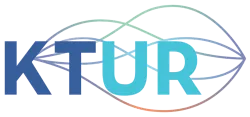
Work Priority 3 is focused on exploring and promoting entrepreneurship in the Upper Rhine region, which spans across Germany, France, and Switzerland. The working group have designed eight interconnected initiatives to support future founders, strengthen startup networks, and increase the region’s innovative capacity.
Interview of Frauke Lorenzen, Projectmanager of “Start-ups at the Upper Rhine” at Freiburg im Breisgau University (on the right) and Océane Marie, Project Manager for KTUR² Cross-Border Entrepreneurship at the University of Strasbourg (on the left)
Question 1. Analysis and visibility
How do you analyze entrepreneurship in such a diverse region?
Océane Marie: We’re conducting a comprehensive study of the entrepreneurial mindset among students at the 12 KTUR² partner universities. It’s based on the international GUESSS survey, which we’ve run twice during the project. The data gives us valuable insights and helps guide the development of the other activities. It also allows for international comparisons.
Question 2. Inspiration and knowledge transfer
Once you have the data, how do you use it to inspire people?
Frauke Lorenzen: One way is through the KTUR² Startup Talks – our podcast series. We share real entrepreneurial stories from across the three countries. It’s inspired by KIT’s successful podcast channel, and we cover practical topics like funding, networking, and marketing. The idea is to make entrepreneurship feel real and relatable.
Question 3. Qualification and exchange
Do you offer any training for future entrepreneurs?
Océane Marie: Absolutely. We have several initiatives:
- The KTUR² Summer School brings together students, PhD candidates, and international partners to co-create project ideas in diverse teams.
- Our advanced training program helps early-stage founders build key management skills.
- And our VC Workshops give students the chance to experience startup investment scenarios alongside real venture capitalists.
Question 4. Networking and collaboration
Networking is crucial. How do you help startups make connections?
Frauke Lorenzen: We organize a Startup Fair, which gives young companies visibility and connects them with potential partners or employees, even in hybrid formats.
There’s also our Innovation Challenges, where student teams work on real-life problems from regional SMEs. It’s a win-win: students learn, and companies get fresh ideas.
Lastly, our Soft Landing Program supports international researchers and early-stage founders exploring the region’s startup scene. We help them with pitch events, introductions, and onboarding support.
Question 5. That sounds like a very comprehensive approach.
What’s the big picture here?
Océane Marie: In short, Work Priority 3 brings together research, education, international exchange, and entrepreneurship. Together, these measures form a vibrant, cross-border network that helps strengthen the entrepreneurial spirit throughout the Upper Rhine region.
Thank you to Frauke Lorenzen and Océane Marie for sharing with us their vision and passion for a more collaborative, international and accessible form of entrepreneurship.
Visit LinkedIn to follow all our latest news.

